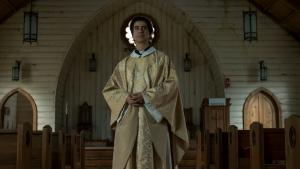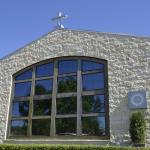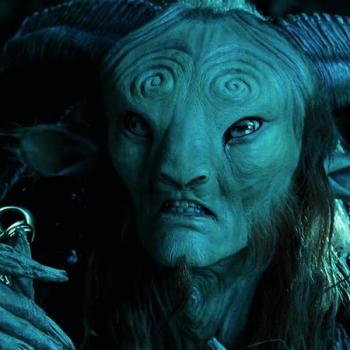
On the recommendation of some folks whose opinions I trust, I recently invested seven hours of my life into Mike Flanagan’s new Netflix horror-drama miniseries Midnight Mass. Flanagan’s directorial approach isn’t always my cup of tea—I have a soft spot for good jump scares and nerve-jangling climaxes, and Flanagan is a slow-burn director—but I must admit, this series ended up worthy of the hype.
(Spoilers throughout. There’s really only one big spoiler for this show worth noting, but you’ve been warned.)
Midnight Mass tells the story of a mysterious Catholic religious revival on a remote Maine island. Under the leadership of charismatic priest Paul Hill, the local parish witnesses striking miracles of healing that defy ready scientific explanation. Naturally, these events are treated with cynicism by the local skeptics, including protagonist Riley—who has recently been released from prison after killing a girl in a drunk-driving accident.
What makes this miniseries so unique is the sheer amount of time it devotes to allowing its characters to “work out their salvation,” so to speak. Lengthy monologues on subjects like the afterlife and the problem of evil are narrative fixtures—and thanks to the very talented actors onscreen, they are mesmerizing. I can’t recall ever seeing a show in this genre so committed to taking its own theological underpinnings seriously.
In perhaps the single best scene of Midnight Mass, Riley and sort-of love interest Erin (a Christian, at least formally) debate their different understandings of what happens after death. Unsurprising, the atheistic Riley argues that death is simply the cessation of consciousness—but it’s the way he argues that’s particularly fascinating. For Riley, haunted by bloody images of the young woman he killed, annihilation promises sweet release from the ghosts of his past, and a total dissolution into the void of nonbeing. It is, in short, a kind of anticipated peace.
What Flanagan manages to convey here—whether intentionally or not—is the idea that ostensibly secular convictions are not always motivated by “objective science.” Riley’s longing for oblivion is an inversion of the claim that Christian beliefs about heaven and the new creation are primarily about wish-fulfillment; for the nontheistic Riley, materialistic self-obliteration is his dearest wish. What could be worse, for the guilt-scarred conscience, than the Christian promise of eternal life—an eternity of reckoning with one’s sins?
This perspectival playfulness isn’t limited to one scene. Indeed, the miniseries’ big twist is that Father Paul is not a miracle worker, but the acolyte of an ancient vampire whom he believes to be a biblical angel. (I don’t think the word “vampire” is ever actually used onscreen, even though we’re talking about creatures that drink blood and burn in sunlight.) And who are we viewers, strictly speaking, to tell Father Paul he’s wrong? We only approach Midnight Mass as an audience reared on Dracula stories and conditioned to spot the “tells” of vampire stories, after all. If the creature at the story’s heart were actually an angel, would we ever be capable of recognizing it as such?
Something like this, I think, is the fundamental philosophical problem underlying arguments about religion that devolve into fights over “evidence.” From the perspective of the classical theist, the presence of any finite reality at all is prima facie evidence of an ontologically infinite Source. As such, every natural thing of any sort testifies to the creative handiwork of God. But for those who do not understand or accept this metaphysical paradigm, the created order is evidence of nothing in particular; it’s just there, raw data from which we might or might not infer the presence of an almighty demiurgic “orderer” existing alongside other beings. The interpretive grid is the whole ballgame, in short; piling up second-order arguments for the reality of the supernatural is somewhat beside the point.
What is expected—and required—is trust. For the Christian, this is always also trust in a person, the author of a transcendent narrative, a living Logos who alone can mitigate the interpretive chaos we experience when we confront the “data” of reality. Apart from that, pretty much everything is epistemological fair game; vampires can be called “angels” and self-extinction can be deemed “heaven.” And that’s the really eerie truth at the core of Midnight Mass.















